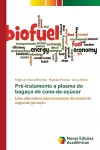
Pré-tratamento a plasma do bagaço de cana-de-açúcar
3 authors - Paperback
£41.42
As a passionate researcher, educator, trainer, consultant, and Professional Engineer of material science and engineering for more than twenty years, Kuan Yew CHEONG is a full Professor at the School of Materials and Mineral Resources Engineering, Universiti Sains Malaysia, Malaysia. Prof. Cheong served as a Commissioned Senior Scientist at Korea Electrotechnology Research Institute (2004, 2006), Adjunct Associate Professor at Multimedia University, Malaysia (2012), Visiting Lecturer at Universiti Malaysia Perlis (2012), Malaysia, Visiting Professor at National Taiwan University (2018), MIMOS Semiconductor Sdn Bhd (2018), and Technical Advisor for NTG Innovation Pte. Ltd., Singapore (January – December 2019). Now, he is an External Examiner for Wawasan Open University (Malaysia), INTI International College Penang (Malaysia), affiliated to Innovation Centre for Clean Water and Sustainable Energy (WISE), National Tsing Hua University, Taiwan (November 2018 to October 2021), Technical Consultant of failure analysis for MIMOS Semiconductor Sdn Bhd (Malaysia), and Editor of “Materials Science in Semiconductor Processing, Elsevier (since 2015). Kuan Yew Cheong has published approximate 200 high impact-factor journals, 6 reputable book chapters, 3 edited books, and 1 granted Malaysian Patent (MY-153033-A), which in-line with his research direction of solving environmental and energy related issue through the development of advanced oxide based on wide bandgap semiconductor and exploring the potential of utilizing natural organic materials to produce “all-natural electronic devices. As a registered Professional Engineer (Board of Engineers, Malaysia), a “Top Research Scientists Malaysia (TRSM) 2013 (Academy of Sciences Malaysia), and a Certified Professional Trainer (Ministry of Human Resource, Malaysia), Prof. Cheong has delivered more than 250 technical training courses to various local and multinational industries and has resolved many industrial cases related to processing of electronic materials both wafer and package levels. Currently, Prof. Cheong is a Fellow of The Institution of Engineers Malaysia (IEM), Senior Member of Institute of Electrical, Electronic Engineers (IEEE), a Principle Interviewer for Professional Interview of IEM and Senior Evaluation Panel of Engineering Program Accreditation under Engineering Accreditation Council, Malaysia. . Prof. Mariana Amorim Fraga is a Visiting Professor at the Federal University of São Paulo - UNIFESP, Brazil. She obtained her MSc in Electrical Engineering from the University of São Paulo (USP, Brazil) and her PhD in Aeronautics and Mechanical Engineering from the Technological Institute of Aeronautics (ITA, Brazil). Her research interests are in the materials science and engineering areas, mainly on the synthesis and characterization of nanomaterials for the development of sensors, electronic devices and energy technologies. She serves as an editorial board member of Materials Science in Semiconductor Processing, Smart Materials in Medicine, Materials Research Express, Frontiers in Mechanical Engineering and IEEE Latin America Transactions. She is a Senior Member of Institute of Electrical, Electronic Engineers (IEEE) and a member of SPIE (The International Society for Optics and Photonics), American Association for the Advancement of Science (AAAS) and American Chemical Society (ACS). Prof. Prashant Sonar is ARC Future Fellow and Professor in School of Chemistry and Physics and Centre for Material Science at Queensland University of Technology, (QUT), Australia. At QUT, he established the Organic and Printed Electronic Research group. Currently, he is serving as an Associate Editor of the journal Flexible and Printed Electronics, Material Research Express (Institute of Physics, London), Frontier in Chemistry and Energies (MDPI, Switzerland). Recently, he has been elected as Fellow of Royal Chemical Society (FRSC) and Foreign Fellow of Maharashtra Academy of Sciences (FFMAS). Prof. Sonar is interested in design and synthesis of novel p-functional materials (small molecules, oligomers, dendrimers, and polymers) for printed electronics, (OFETs, OLEDs, OPVs, OLETs, OPDs, and Sensors), perovskite solar cells, bioelectronics supramoleculecular electronic and wearable electronic applications. Prof. Rodrigo Pessoa received an undergraduate degree in Physics from Universidade Estadual Paulista Julio de Mesquita Filho, UNESP (2003), Master of Science degree in the field of Plasma Physics from Technological Institute of Aeronautics (2005) and Doctorate in Sciences in the field of Plasma Physics from Technological Institute of Aeronautics (2009). He is currently a research professor at the Instituto Tecnológico de Aeronáutica. He has experience in physics, with emphasis on Condensed Matter Physics and Plasma Physics, Plasma Engineering, Aerospace Engineering and Microelectronics. He has interest in new types of plasma reactors, new materials and processes for microelectronics, aeronautical/aerospace engineering, micro-electromechanical devices (MEMS), solar cell and nanotechnology. Jannu Casanova-Moreno works at CONACYT-Centro de Investigación y Desarrollo, Tecnológico en Electroquímica, Mexico